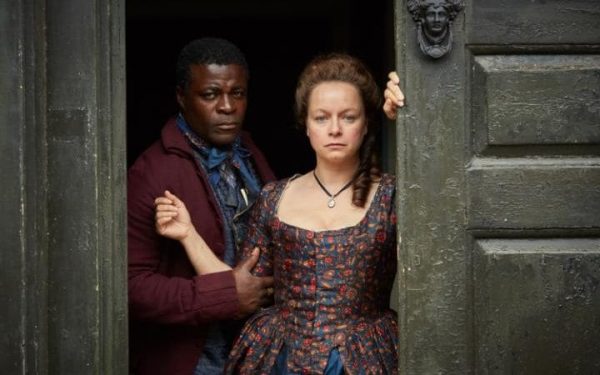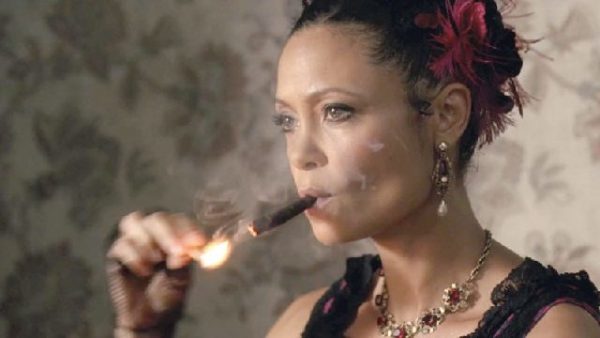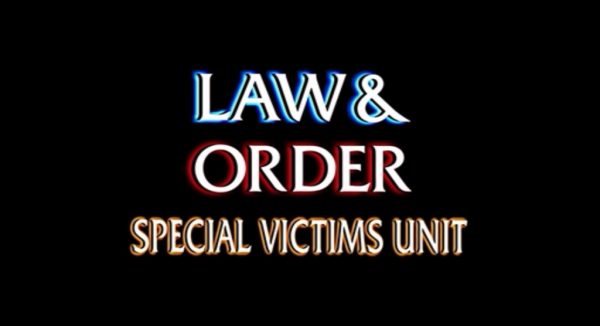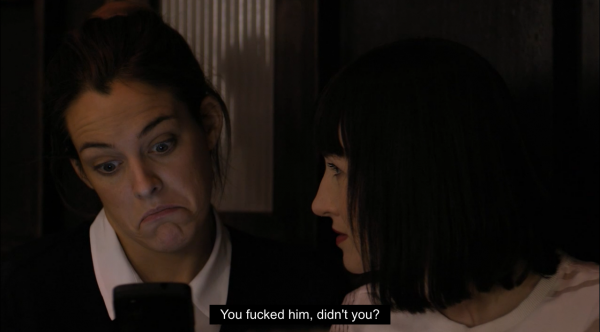The History Behind Harlots

Harlots is a new drama on Hulu following the misadventures and rivalries of two competing brothels in mid-18th century London. Created by Moira Buffini and Allison Newman, and loosely based on research by Hallie Rubenhold, Harlots isn’t only notable for being about harlots—all the writers and directors are women also, which allows for a truly unprecedented lack of the male gaze and titillation shots, and instead creates room for the characters to be fully-fleshed people. History geek Tits and Sass contributors Kitty Stryker and Red discuss the first episodes and what sex worker life was like in the Georgian England setting of the show.
On historical context:
Kitty: The one in five women are sex workers at the time statistic, cited in the beginning of the show, is a high estimate, but it is quoted a lot, and may not be incorrect. The number appears to come from historian Dan Cruickshank in his book, The Secret History Of Georgian London: How The Wages Of Sin Shaped The Capital. He is also where the number of of £1.5 billion in today’s money as the gross turnover of sex work funds at the time comes from.
Red: Capitalism and a market economy were just starting to take over and the situation of women was changing, as the public sphere became the exclusive province of men in England. At the same time, capitalism was pushing the growth of a relatively new genre: porn! Much of the earliest porn consists of dialogues between whores or a whore recounting her exploits (a la Fanny Hill).
While the one in five stat is high, women dipped in and out of sex work as necessary, and the word whore didn’t exclusively mean a professional until later on in the century.
Kitty: It’s also worth noting that while sex work was prominent, “bawds,” or madams, were deeply loathed by London society—one famous bawd was stoned to death for her part in “corrupting the innocent.” Now, to be fair, many bawds did go around looking for naive farm girls to offer free housing to, only to then trap them with false debt for the lodgings and food they used. But this is also definitely where the hatred of pimps strongly developed.
Covent Garden was the place for sex workers at the time! Golden Square, also referenced in the show, incidentally, went from being a place for wealthy up-and-coming sex workers to a place for dire poverty—it becomes the epicenter of the cholera epidemic that wiped out a lot of London in 1854.
On Harris’ List, an anonymous book of commentary on Covent Garden prostitutes, a kind of antecedent to today’s board escort reviews—the show opens with Lucy (Eloise Smyth) reading each brothel worker’s entry aloud to her:
Kitty: The history of Harris’s List is actually super interesting and this was a good book on it—Covent Garden Ladies by Hallie Rubenhold, the book this show is actually loosely based on. You can read the list here for free, by the way!
Red: Charlotte (Jessica Brown Findlay) is based on a real woman Rubenhold wrote about, and so is her mother—Elizabeth Ward, Samantha Morton’s character. They changed the last name to Wells in the show, and her first name to Margaret. The real Charlotte changed her last name to Hayes after she got her first rich protector and left her mother’s brothel.
Interesting note: Some of the women who paid Harris to write good reviews of them in his list formed a “Whores’ Club” where they met and drank together and paid dues, and any of the club members who needed help got some of the dues.
On the contract Charlotte’s thinking about signing with her benefactor and how it compared to marriage at the time:
These contracts were common among famous, sought-after sex workers. Some had two or more going at a time sometimes! Many times these contracts were oral contracts, and would stipulate how much the kept woman would get per month in cash and gifts, if she would be given an apartment or not, if her bills would be paid, new clothing, etc.
Because what she gave in exchange was often just “understood,” it left a lot of wiggle room for her. Often, when such a contract was broken and the arrangement was declared over, she could also negotiate for annuities, perhaps in exchange for keeping his secrets.
One attractive thing about having such a contract is that the person paying often paid to the bawd who “owned” the sex worker in question. In order for the sex worker to be “released” to the status of kept woman, the buyer would have to pay off all debts the sex worker had accrued according to the bawd. Becoming a kept woman could mean less risk of syphilis, which was a disfiguring death sentence at the time, and also could mean when the arrangement ended, you were free to do what you wanted as you weren’t indebted to a house anymore.
I think it’s interesting that while Margaret obviously feels a lot of resentment for being sold to Lydia Quigley (Lesley Manville) when she was 10 (a sadly pretty common occurrence at the time—the youngest on record was eight, and people believed having sex with a child would cure you of STIs), and Charlotte’s virginity was auctioned off at the age of consent (which was 12 for girls, 14 for boys at the time), Lucy appears to be at least 18 and is still “not ready.” I wonder if Charlotte is upset that her mother got her into sex work, or that she’s upset that despite her mother’s distaste for marriage, here she is being roped into a different but similar contract with Sir George Howard (Hugh Skinner).
Red: My main thoughts on watching were how laughably anachronistic both Charlotte and Lucy ‘s (a fictional character made up for the show) unwillingness to participate in such a huge money generating activity is. The contract that Charlotte turns her nose up at wouldn’t have given him anything close to coverture over her. Instead, it would have offered her either carte blanche over his money or a specific amount of credit to use when shopping. It couldn’t have prevented her from having other lovers; he would have to rely on her discretion. The idea that someone raised in the poverty of Covent Garden would turn up her nose at that and just want to fuck for money without it is so hilarious to me. This was the ultimate goal of whores in the 18th century, because it was a step up to a security just below that of marriage (which also could and did happen between contemporary sex workers and their clients).
My guess is that Charlotte’s reluctance comes from the producers thinking they need some sort of 21st century young woman angst in order to make these characters relatable.



